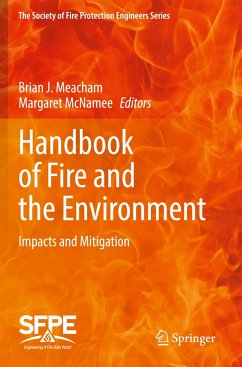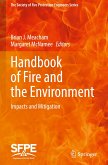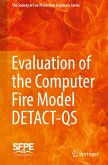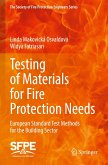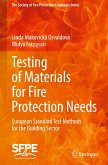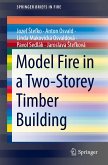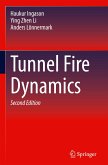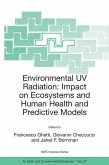Handbook of Fire and the Environment
Impacts and Mitigation
Herausgegeben:Meacham, Brian J.; McNamee, Margaret
Handbook of Fire and the Environment
Impacts and Mitigation
Herausgegeben:Meacham, Brian J.; McNamee, Margaret
- Broschiertes Buch
- Merkliste
- Auf die Merkliste
- Bewerten Bewerten
- Teilen
- Produkt teilen
- Produkterinnerung
- Produkterinnerung
The fundamental purpose of this handbook is to raise awareness about environmental impacts of fire and fire suppression, primarily within the fire engineering and firefighting communities, but also within the environmental engineering and planning disciplines. The Handbook provides readers with a fundamental understanding of the problem and its magnitude and includes a set of tools and methods for assessing environmental, social and financial impacts, and a set of tools for identifying and selecting appropriate mitigation options.
Andere Kunden interessierten sich auch für
![Handbook of Fire and the Environment Handbook of Fire and the Environment]() Handbook of Fire and the Environment171,99 €
Handbook of Fire and the Environment171,99 €![Evaluation of the Computer Fire Model DETACT-QS Evaluation of the Computer Fire Model DETACT-QS]() Society for Fire Protection EngineersEvaluation of the Computer Fire Model DETACT-QS67,99 €
Society for Fire Protection EngineersEvaluation of the Computer Fire Model DETACT-QS67,99 €![Testing of Materials for Fire Protection Needs Testing of Materials for Fire Protection Needs]() Linda Makovická OsvaldováTesting of Materials for Fire Protection Needs112,99 €
Linda Makovická OsvaldováTesting of Materials for Fire Protection Needs112,99 €![Testing of Materials for Fire Protection Needs Testing of Materials for Fire Protection Needs]() Linda Makovická OsvaldováTesting of Materials for Fire Protection Needs112,99 €
Linda Makovická OsvaldováTesting of Materials for Fire Protection Needs112,99 €![Model Fire in a Two-Storey Timber Building Model Fire in a Two-Storey Timber Building]() Jozef StefkoModel Fire in a Two-Storey Timber Building45,99 €
Jozef StefkoModel Fire in a Two-Storey Timber Building45,99 €![Tunnel Fire Dynamics Tunnel Fire Dynamics]() Haukur IngasonTunnel Fire Dynamics165,99 €
Haukur IngasonTunnel Fire Dynamics165,99 €![Environmental UV Radiation: Impact on Ecosystems and Human Health and Predictive Models Environmental UV Radiation: Impact on Ecosystems and Human Health and Predictive Models]() Francesco Ghetti / Giovanni Checcucci / Janet F. Bornman (eds.)Environmental UV Radiation: Impact on Ecosystems and Human Health and Predictive Models75,99 €
Francesco Ghetti / Giovanni Checcucci / Janet F. Bornman (eds.)Environmental UV Radiation: Impact on Ecosystems and Human Health and Predictive Models75,99 €-
-
-
The fundamental purpose of this handbook is to raise awareness about environmental impacts of fire and fire suppression, primarily within the fire engineering and firefighting communities, but also within the environmental engineering and planning disciplines. The Handbook provides readers with a fundamental understanding of the problem and its magnitude and includes a set of tools and methods for assessing environmental, social and financial impacts, and a set of tools for identifying and selecting appropriate mitigation options.
Produktdetails
- Produktdetails
- The Society of Fire Protection Engineers Series
- Verlag: Springer / Springer International Publishing / Springer, Berlin
- Artikelnr. des Verlages: 978-3-030-94358-5
- 1st edition 2023
- Seitenzahl: 508
- Erscheinungstermin: 29. Juli 2023
- Englisch
- Abmessung: 235mm x 155mm x 28mm
- Gewicht: 762g
- ISBN-13: 9783030943585
- ISBN-10: 3030943585
- Artikelnr.: 68357499
- Herstellerkennzeichnung Die Herstellerinformationen sind derzeit nicht verfügbar.
- The Society of Fire Protection Engineers Series
- Verlag: Springer / Springer International Publishing / Springer, Berlin
- Artikelnr. des Verlages: 978-3-030-94358-5
- 1st edition 2023
- Seitenzahl: 508
- Erscheinungstermin: 29. Juli 2023
- Englisch
- Abmessung: 235mm x 155mm x 28mm
- Gewicht: 762g
- ISBN-13: 9783030943585
- ISBN-10: 3030943585
- Artikelnr.: 68357499
- Herstellerkennzeichnung Die Herstellerinformationen sind derzeit nicht verfügbar.
Brian J. Meacham, PhD, PE (CT&MA), EUR ING, CEng (UK), FIFireE, FSFPE Brian is Managing Principal of Meacham Associates in the USA. He has more than 35 years of professional experience in academia, consulting and industry. He focuses primarily on risk-informed and performance-based solutions to fire and regulatory challenges in the built environment. Brian is Chair of the International Association for Fire Safety Science (IAFSS), Chair of the National Fire Protection Association (NFPA) Technical Committee on Fire Risk Assessment Methods, a Past President of the Society of Fire Protection Engineers (SFPE), and a past Chair of the Inter-jurisdictional Regulatory Collaboration Committee (IRCC). He is a licensed Professional Engineer in Connecticut and Massachusetts, a Chartered Engineer and Fellow of the Institution of Fire Engineers (UK), a registered European Engineer (EUR ING), a Fellow of the Society of Fire Protection Engineers, and a Fulbright Global Scholar. Margaret McNamee, PhD Margaret McNamee is Professor in Fire Safety Engineering at Lund University in Sweden. She has her technical expertise in understanding and characterizing the environmental impact of fires and has worked in the field of fire and combustion research for more than 30 years. Among other things, Margaret is active in the International Association of Fire Safety Science (IAFSS) and was the first author of the IAFSS position paper on fire safety research challenges for the future ¿ IAFSS Agenda 2030 for a Fire Safe World.
Chapter 1. Introduction and overview (Meacham and M. McNamee).- Chapter 2. Historically significant fires (M. McNamee, Marlair and Truchot).- Chapter 3. Fire fundamentals (Gorbett and Kozhumal).- Chapter 4. Fire and smoke modeling (Wegrzynski and Lipecki) .- Chapter 5. Emission measurements (Guillaume).- Chapter 6. Fires in enclosures (R. McNamee and Sandvik).- Chapter 7. Wildland fire (Filkov, Cawson, Swan and Penman).- Chapter 8. Firefighting chemicals (González-Prieto).- Chapter 9. Tools and techniques for impact analysis (M. McNamee, Butry, Kneifel).- Chapter 10. Mitigation strategies for buildings (Meacham).- Chapter 11. Mitigation strategies for waste fires (Fjellgaard Mikalsen, Storesund).- Chapter 13. Mitigation strategies for Wildfires (Parkins, Cawson, Pickering Penman).- Chapter 12. Sustainable and fire resilient built environment (SAFR-BE) (Meacham and M. McNamee).
Chapter 1. Introduction and overview (Meacham and M. McNamee).- Chapter 2. Historically significant fires (M. McNamee, Marlair and Truchot).- Chapter 3. Fire fundamentals (Gorbett and Kozhumal).- Chapter 4. Fire and smoke modeling (Wegrzynski and Lipecki) .- Chapter 5. Emission measurements (Guillaume).- Chapter 6. Fires in enclosures (R. McNamee and Sandvik).- Chapter 7. Wildland fire (Filkov, Cawson, Swan and Penman).- Chapter 8. Firefighting chemicals (González-Prieto).- Chapter 9. Tools and techniques for impact analysis (M. McNamee, Butry, Kneifel).- Chapter 10. Mitigation strategies for buildings (Meacham).- Chapter 11. Mitigation strategies for waste fires (Fjellgaard Mikalsen, Storesund).- Chapter 13. Mitigation strategies for Wildfires (Parkins, Cawson, Pickering Penman).- Chapter 12. Sustainable and fire resilient built environment (SAFR-BE) (Meacham and M. McNamee).

